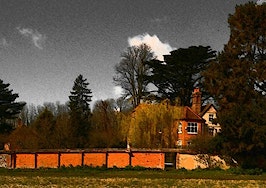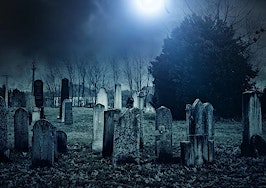- In California, the death has to be disclosed if it's happened in the past three years; and if it's an AIDS-related passing, agents are required to pass on telling what happened.
- One concern when purchasing a home with bloody past is if there were any biohazard considerations because the seller would have to disclose whether they used the appropriate cleanup crew to clean up the mess.
- There's a real killing in profits for haunted bed and breakfasts across the country. You can stay at the house where Lizzie Borden killed her parents. A night of the creepy crawlies starts at $200 a room.
They’re creepy and they’re kooky — mysterious and spooky; they’re altogether ooky … the homes where a death took place.
Well, for some, anyway.
Having been in the real estate business nearly a decade, I’ve run across my fair share of homes with a few skeletons in the closet. Usually, it’s your typical leaky cauldron — I mean, sink — or the deep dark holes under the home (I’m serious about that one; don’t get me started on sinkholes).
But occasionally we run into the home for sale that has a frightening past — say, a murder-suicide or maybe just a plain old ordinary death that has taken place on the premises.
So I thought I’d dive into the topic and teach others what they can expect to learn about a home’s wicked past and possible left behind residents.
The rules about disclosing death
The first thing to know: Unless you are in California, agents don’t need to tell buyers anything about a death that’s taken place on the property. And even in California it’s a little iffy.
The death has to be disclosed if it’s happened in the past three years, and if it’s an AIDS-related passing, agents are required to pass on telling what happened.
Typically, an owner and seller of a property is required to disclose anything that is a material defect and can affect the value of the home.
Items such as nonfunctioning appliances or converted garages are easier to put a number to, but how do you put a price on death? I’m not an attorney, but that would be a hard bone to dig up.
Advice from agents with spectral experience
That said, your best bet is probably to disclose it. I interviewed some of my Facebook friends to see what they thought about revealing the homes questionable past and the overwhelming response was to tell. And surprisingly, I found quite a few of my friends have lived with the dead.
Sharon Vance, homeowner and Florida Realtor, says her current home has a woman ghost residing there, but she’s not afraid. Supposedly, the woman was the original owner, who died there.
Sharon even had the home investigated by some paranormal investigators. She said she was leaving, so Sharon took that as a good sign.
And my girlfriend, Dawn Dugle, has lived in various homes across the country, some of which she encountered some odd midnight antics.
Her only concern when purchasing a home with bloody past was if there were any biohazard considerations. Because the seller would have to disclose whether they used the appropriate cleanup crew to clean up the mess. There’s something to chew on — yuck!
OK, so ghosts are subjective, right? (And we don’t need to disclose Casper, by the way.) But some significant homes in this country have had brushes with the dead (not to mention some afterlife sightings).
The value in dealing with death
Ponder this: Two presidents of the United States have died in the White House. Do you think the incoming president will turn down living in that historic home because someone died there? I doubt it.
Not to mention, there’s a real killing to be made in profits for haunted bed-and-breakfasts across the country. For example, you can stay at the house where Lizzie Borden killed her parents; it’s just outside Boston. A night of the creepy crawlies starts at $200 a room.
Aren’t you dying to stay a night or two? Many check in, but do they check out?
But all this talk about divulging a home’s morbid memories makes me wonder what else sellers might be obligated to reveal, and would it kill the deal for buyers?
For example, what if the neighbor is a real jack-o’-lantern? Or there’s an occasional odd odor that blows in when the moon is high? Do you want to start stirring that pot of potion?
My Rhode Island Realtor associate Marc Carlson says if he knows it, he shares it, “If there is something that could affect the quality of living in the home, then I will disclose it to the buyer, even if there are ghosts.”
You see, agents ain’t afraid of no ghosts — or the truth, for that matter.
Secrets rise from their graves
Everything eventually gets dug up during a real estate transaction anyway, so save yourself the nightmare and disclose what you know.
And my advice for your buyers: Google that ghost — I mean potential home.
Search the address online, and you will be surprised what truths will pop up. And if all else fails, they can just ask if there is anything that might go bump in the night.
Odds are, we are going to share it. Steve Retalic of Keller Williams Elite Partners says if he knows something bad went down in the home, he would feel obligated to share the truth. “It most likely would have been on the news, so it would be publicly known anyway,” he said.
So in the end — the dead end, that is — the truth will prevail for all parties involved because you never want to be the one whose past comes back to haunt you…a ghost, lawsuit or both.
Sue Benson is the Pink Lady of real estate. Find her on Facebook or follow her on Twitter @sueispinky.








